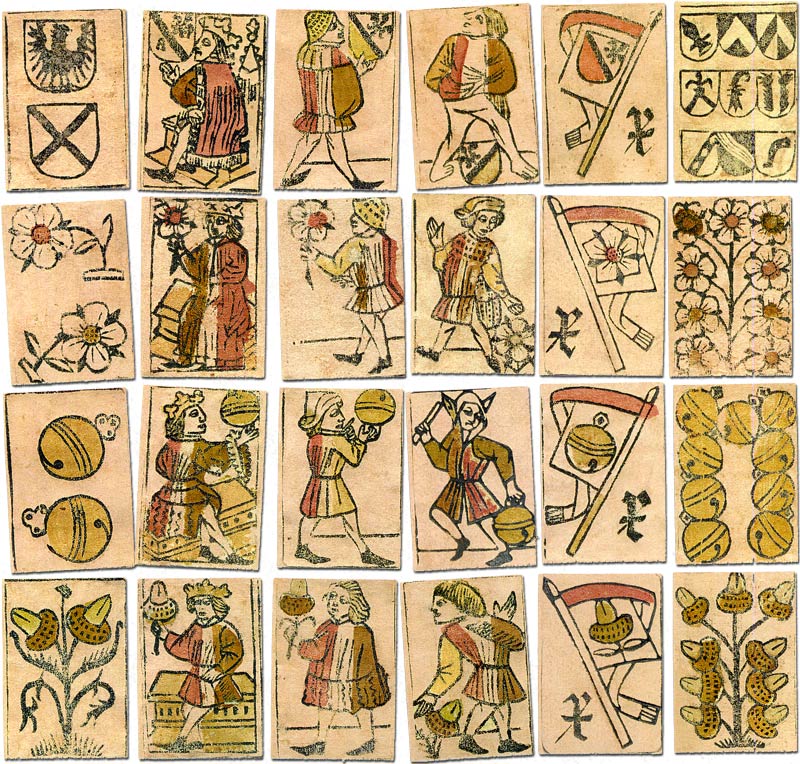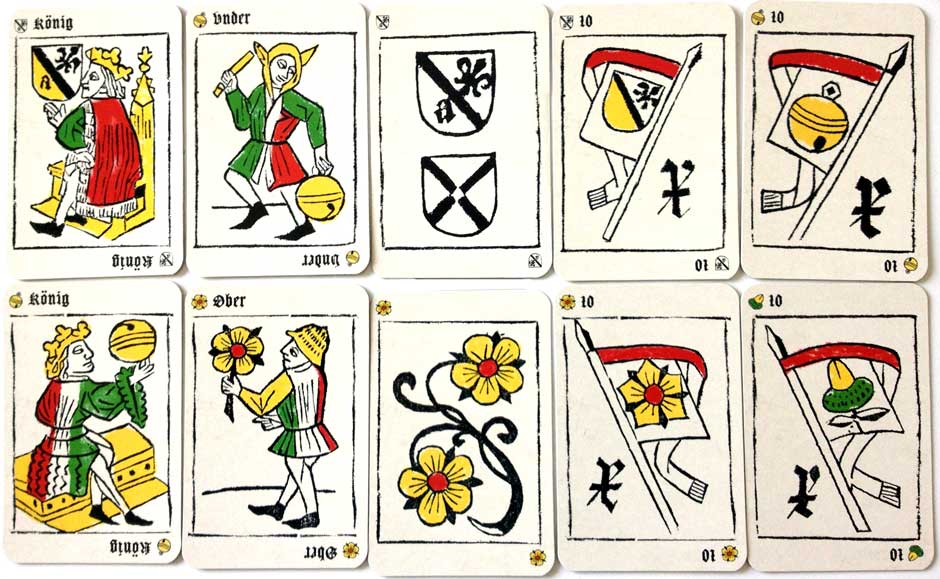Antique Swiss Playing Cards, c.1530
The Swiss national suit system of shields, acorns, hawkbells and flowers originated sometime during the fifteenth century.
The Swiss national suit system of shields, acorns, hawkbells and flowers originated sometime during the fifteenth century. The playing cards shown here were originally made in Basel, c.1530. They were discovered inside a book cover and reproduced in 1998 to celebrate the 20th anniversary of Cartophilia Helvetica. A distinguishing feature is the "banner 10" cards, which are now more or less counted as an ace. The kings are seated. The same designs can be seen three hundred years later in the cards of David Hurter, c.1830.

Above: cards from reprint by AGM Müller in 1998.
A second set of antique Swiss playing cards was discovered in May 2011 at Nidwaldner State Archives inside the covers of an old book during restoration. The cards were ‘reconstructed’ into a reproduction pack of 48 cards.

Above: cards from a reproduction by Druckerei Odermatt (www.dod.ch). Image courtesy Bert Kaspersma.

By Simon Wintle
Member since February 01, 1996
I am the founder of The World of Playing Cards (est. 1996), a website dedicated to the history, artistry and cultural significance of playing cards and tarot. Over the years I have researched various areas of the subject, acquired and traded collections and contributed as a committee member of the IPCS and graphics editor of The Playing-Card journal. Having lived in Chile, England, Wales, and now Spain, these experiences have shaped my work and passion for playing cards. Amongst my achievements is producing a limited-edition replica of a 17th-century English pack using woodblocks and stencils—a labour of love. Today, the World of Playing Cards is a global collaborative project, with my son Adam serving as the technical driving force behind its development. His innovative efforts have helped shape the site into the thriving hub it is today. You are warmly invited to become a contributor and share your enthusiasm.
Related Articles

French Revolutionary cards by Pinaut
Seven cards from a French Revolutionary pack by Pinaut featuring characters from classical antiquity...

Zürcher Festspiel 1903
Swiss-suited pack designed by Robert Hardmeyer featuring figures from art and politics.

The Tarot of Meditation – Yeager Tarot
Marty Yeager’s original Tarot of Meditation from 1975, republished later by U.S. Games Systems, Inc....

Trappola cards from Poland
Trappola cards published in Warsaw by J G Du Port during the 18th century.

Modern Jass (Fredy Sigg)
Caricatural updating of traditional Swiss Jass cards by the artist Fredy Sigg.

Swiss playing cards by Iehan Hemau
17th century Swiss-suited playing cards by Iehan Hemau of Épinal.

Laurenzo Propagine
Spanish-suited cards made in Italy by Laurenzo Propagine.

Rouen Pattern - Portrait Rouennais
An attractive XV century French-suited design from Rouen became the standard English & Anglo-America...

Archaic Spanish proof sheets
2 x uncoloured proof sheets of archaic Spanish-suited playing cards produced for “New Spain”, possib...

Ganjifa - Playing Cards from India
Indian playing cards, known as Ganjifa, feature intricate designs with twelve suits and are traditio...

The Henry Hart Puzzle
Explore the intricate history and unique design variations of Henry Hart's playing cards, tracing th...

Sevilla 1647 reproduction
Facsimile of Spanish-suited pack produced in Sevilla, Spain, 1647.

Why our playing-cards look the way they do
Analysis of early playing card designs: origins, suit differences, standardization, technological ad...

Introduction to Collecting Themes
Playing cards can be broadly categorised into standard and non-standard designs, with collectors app...

Le Monde Primitif Tarot
Facsimile edition produced by Morena Poltronieri & Ernesto Fazioli of Museo Internazionale dei Taroc...

Le Roi bridge
Reprint of a Piatnik (Budapest) pack of 1927 with Hungarian historical figures and scenic aces.
Most Popular
Our top articles from the past 28 days

